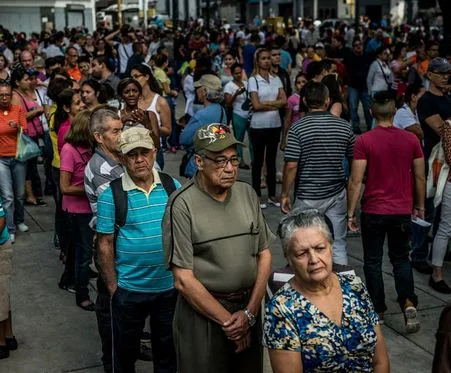Venezuelans overwhelmingly reject Nicolás Maduro’s plans for a constituent assembly
Millions of Venezuelans signaled their disapproval of President Nicolás Maduro’s plan to hold a constituent assembly by casting ballots on Sunday in a vote unlike any other in this nation’s history.

Venezuelans lined up to vote in Caracas. (New York Times)
More than 98 percent of voters sided with the opposition in answering three yes-or-no questions drafted with the aim of weakening Mr. Maduro’s legitimacy days before his constituent assembly is expected to convene. Opponents see the assembly as a power grab by an increasingly unpopular leader and fear he may use it to do away with democratic elections.
Sunday’s exercise, known as a popular consultation, was organized by a slate of opposition parties that dominate Venezuela’s National Assembly.
Organizers had hoped that a large turnout and a lopsided result would widen rifts within the governing party and deepen the government’s international isolation, undermining Mr. Maduro’s plan to appoint an assembly of handpicked supporters to draft a new Constitution.
Shortly before midnight, a group of Venezuelan university administrators tasked with overseeing the vote count said that more than 7,186,000 ballots had been cast. Organizers hailed the outcome and the turnout.
“This country demonstrated once again that it conquers its aspirations through the vote,” Cecilia García Arocha, the head of the Central University of Venezuela, said as she announced the results.
“This fight was born on the street and today it continues and will continue to be waged on the streets until we restore democracy and liberty,” Leopoldo López, an opposition leader released from prison and placed under house arrest last weekend, said on Twitter. “Today millions decide and establish a mandate. No one should doubt that it is binding and that we must defend it and ensure it is heeded.”
Voters were asked whether they rejected the effort to hold a constituent assembly that has not been approved by voters; whether they wanted the country’s armed forces to uphold the current Constitution and the decisions of the opposition-run National Assembly; and whether they wanted free elections to pick a new “national unity government.”
The Venezuelan Constitution passed under Mr. Maduro’s predecessor, Hugo Chávez, in 1999 includes a provision authorizing popular consultations as a means of safeguarding “people’s exercise of their sovereignty.” Venezuela’s election commission did not play a role in Sunday’s vote, which was run by volunteers. The opposition, citing the Constitution, says the vote is binding, but the government dismisses it as illegitimate.
While Mr. Maduro is widely expected to ignore the outcome, organizers hope that it invigorates a protest movement that has gained momentum over the past couple of months. Tensions have soared across Venezuela amid widespread food and medicine shortages and spiraling inflation that the government routinely plays down.
For ordinary Venezuelans, Sunday’s vote was the first opportunity to cast ballots since the 2015 legislative election that ended the United Socialist Party’s dominance of the National Assembly. The government has postponed every election that was scheduled to take place since then.
While the vote unfolded smoothly in most cities, there were scattered reports of violence and intimidation, including the killing of a 61-year-old woman on the outskirts of Caracas, the capital, during an attack by gunmen near a voting site. The attorney general’s office identified the woman, a nurse, as Xiomara Escot.
Voters waited in line for hours to slip ballots printed on simple paper into old cardboard boxes that bore logos of items such as toilet paper and doughnuts.
Daniela Ramos, 64, a homemaker in Caracas, said she was voting with a heavy heart. One of her daughters, a mother of two, was killed during a robbery. The killing prompted her other daughter to move to the United States. “I vote so my daughter can come back,” she said. “I vote for my slain daughter.”
Rainiero Paz, 39, said he was stunned by the turnout. “This exceeded our expectations; I haven’t even seen this during presidential elections,” said Mr. Paz, who recently lost his job at a warehouse after Mr. Maduro ordered wage increases.
While opponents of the government lined up to vote, Maduro loyalists held a “drill” for the constituent assembly, calling on supporters to participate in a mock voting exercise that was covered widely on state-run news outlets. The turnout for that was notably thin.
Attorney General Luisa Ortega, who recently broke ranks with Mr. Maduro and has criticized his plan to convene a constituent assembly as undemocratic, stopped by an opposition-run voting station. As she greeted voters, one told her, “Welcome to freedom.”
Ms. Ortega’s husband, a lawmaker from Mr. Maduro’s United Socialist Party, cast a ballot responding only to the first question.
Abroad, opposition leaders set up dozens of polling stations in cities with large communities of Venezuelan expatriates. In Rio de Janeiro, voters lined up at a park next to a large banner that said “S.O.S. Venezuela.”
“Our best weapon is this: our vote,” said María Carolina Ceballos, 31, who had a Venezuelan flag wrapped around her shoulders. “We reject violence and we will continue to defend Venezuela always through democratic means.”
_________________
Credit: New York Times, www.nytimes.com





















